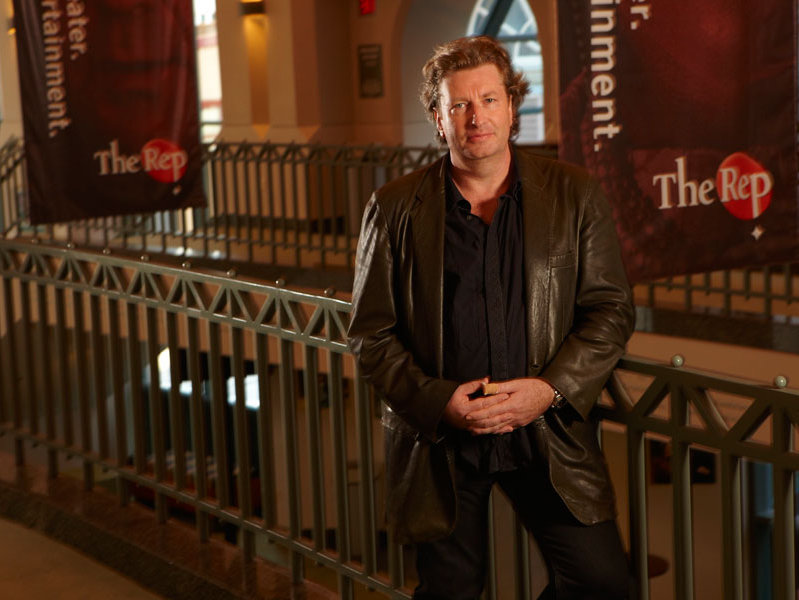More than a year ago, the Milwaukee Rep began retooling, reshaping and refocusing with the intention of having a higher profile in the community. No performing arts group in the city has had more financial and organizational stability than the Rep during the past four decades, but the company's board elected to shake things up when vacancies occurred in both the artistic and managing director positions.
The idea was to pro-actively respond to the changing culture and economy before a crisis struck. Among the goals was attracting a wider swath of theater-goers with more aggressive outreach and more diverse programming. Alter the artistic formula into which the Rep had comfortably settled, and don't wait for the customers to come to you.
New managing director Dawn Helsing Wolters arrived in the summer of 2009 with an advanced degree in theater management from Yale and experience running the Court Theatre, a Chicago company smaller than the Rep. She immediately injected a breezy energy and outgoing personality into an organization noted for being rather introverted.
When British director Mark Clements was introduced to Milwaukee as the Rep's new artistic director last October, he and Helsing Wolters spent a week touring the city like campaigning politicians, shaking hands and working rooms from a luncheon in Brookfield and a reception at the Harley Museum to a Renaissance Theaterworks preview at the Broadway Theatre Center. The company's new leadership had clearly brought a different style of engaging the public to the Rep.
The announcement in March that Clements would launch his Rep career in September by directing the theater's first full-scale Broadway musical, "Cabaret," certainly heightened the anticipation of the beginning of a new era at the Milwaukee Repertory Theater. Few of us ever thought we would see the Kit Kat girls cavorting in the Quadracci Powerhouse Theater.
Now show time is near. "Cabaret" opens Friday, Sept. 17, and as we look ahead to Clements' first season as the Rep's creative leader, several early conclusions can be made.
He works well with his fellow artists. The buzz from the rehearsal hall is quite positive.
He has kept his promise to emphasize collaborations with local and national stage artists. Milwaukee Ballet Company artistic director Michael Pink is serving as choreographer for "Cabaret," and Skylight Opera Theatre artistic director Bill Theisen is making his Rep acting debut in "Laurel and Hardy," the season opener in the Stackner Cabaret. Furthermore, the March 4-27, 2011 staging of "Ma Rainey's Black Bottom" in the Quadracci Powerhouse Theater is a co-production with the Actors Theatre of Louisville.
Most members of the Rep's resident acting company will return this season, although we may not see as much of them as in the past. Torrey Hanson and Rose Pickering have taken leaves of absence for the year, and Brian Vaughn has moved from Milwaukee to be the new co-artistic director of the Utah Shakespearean Festival in Cedar City, Utah. However, Vaughn and Clements have not ruled out the actor occasionally returning to act at the Rep, and Clements has raised the possibility of a future collaboration between the two companies.
Some of the resident actors will be seen in only two shows this season, but in Laura Gordon's case, she will also direct two productions. Two company members, Lee Ernst and Jonathan Gillard Daly, are in "Cabaret." Ernst plays the nightclub master of ceremonies, and Daly was cast as the Jewish fruit seller Herr Schultz.
Two local stage veterans who have often worked at the Rep, Angela Iannone and Linda Stephens, are also in the show. Sally Bowles is being played by Kelley Faulkner, a formerly Philadelphia-based actress who recently moved to Milwaukee.
Clements' professional resume includes numerous musicals, and he is sensitive to speculation in some quarters that he is turning the Rep into a musical theater company. He makes the point that his job is to tell stories, and sometimes those stories use the musical theater genre. "I have always seen myself as a director of plays who also does musicals," the new artistic director said when he was introduced to Milwaukee last fall.
"The American musical is one of this country's greatest contributions to world theater," he told me in March. ""Cabaret' is a musical that has something to say."
Clements is emphasizing the "Cabaret" message in the Rep's production. Jody Hirsh, the Jewish Community Center's Judaic education director, is a consultant on the show. He has given the cast a Power Point presentation on the Weimar Republic and the rise of the Third Reich, showed the cast several relevant films, sat in on rehearsals and written a piece for the "Cabaret" program.
"I tried to help them understand the crowd mentality, being swept away," Hirsh recently said. "We discussed how the Nazis could grow from a small fringe group to an unstoppable force."
In a chat last month, Clements said political extremism and how it relates to mainstream citizens is a relevant issue today.
Three different stage versions of "Cabaret," plus the movie adaptation, exist. None of the scores are identical.
The Sam Mendes interpretation, which ran for nearly six years on Broadway after opening in 1998, received a lot of attention for its in-your-face sexuality. Clements has chosen to use a Hal Prince version that had a much shorter Broadway run in the ‘80s.
"I think the story, the content got hijacked by the style in the Mendes version," he explained. "Story comes first. ‘Cabaret' is an incredibly subtle bit of theater, and that is what I am trying to shoot for. Nuance is necessary."
Befitting a production on Broadway, the Rep will field a cast of 33, including 12 acting interns. Sound and lighting upgrades have been installed for "Cabaret" in the Quadracci Powerhouse Theater. Managing director Helsing Wolters points out that those permanent improvements will benefit future shows in the space.
Physical enhancements have been made to the company's other performance venues during the summer. The Stiemke Theater now has new and more comfortable seating, and its lobby has been softened with more inviting furniture and other design elements.
Warmer lighting has been added to the Stackner Cabaret, which is also having its food menu tweaked.
"We want the theater-going experience to be on the same high level as the art," Clements explained. "We want the public to feel welcome here after they have bought a ticket."
Damien has been around so long, he was at Summerfest the night George Carlin was arrested for speaking the seven dirty words you can't say on TV. He was also at the Uptown Theatre the night Bruce Springsteen's first Milwaukee concert was interrupted for three hours by a bomb scare. Damien was reviewing the concert for the Milwaukee Journal. He wrote for the Journal and Journal Sentinel for 37 years, the last 29 as theater critic.
During those years, Damien served two terms on the board of the American Theatre Critics Association, a term on the board of the association's foundation, and he studied the Latinization of American culture in a University of Southern California fellowship program. Damien also hosted his own arts radio program, "Milwaukee Presents with Damien Jaques," on WHAD for eight years.
Travel, books and, not surprisingly, theater top the list of Damien's interests. A news junkie, he is particularly plugged into politics and international affairs, but he also closely follows the Brewers, Packers and Marquette baskeball. Damien lives downtown, within easy walking distance of most of the theaters he attends.







